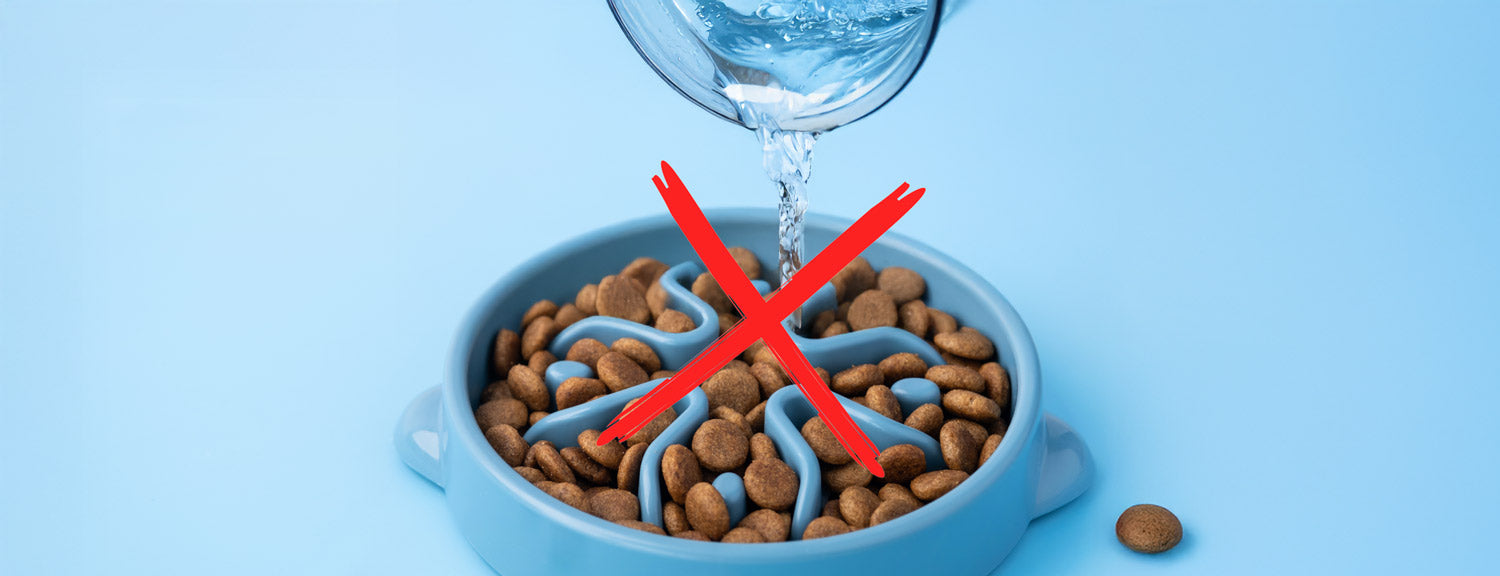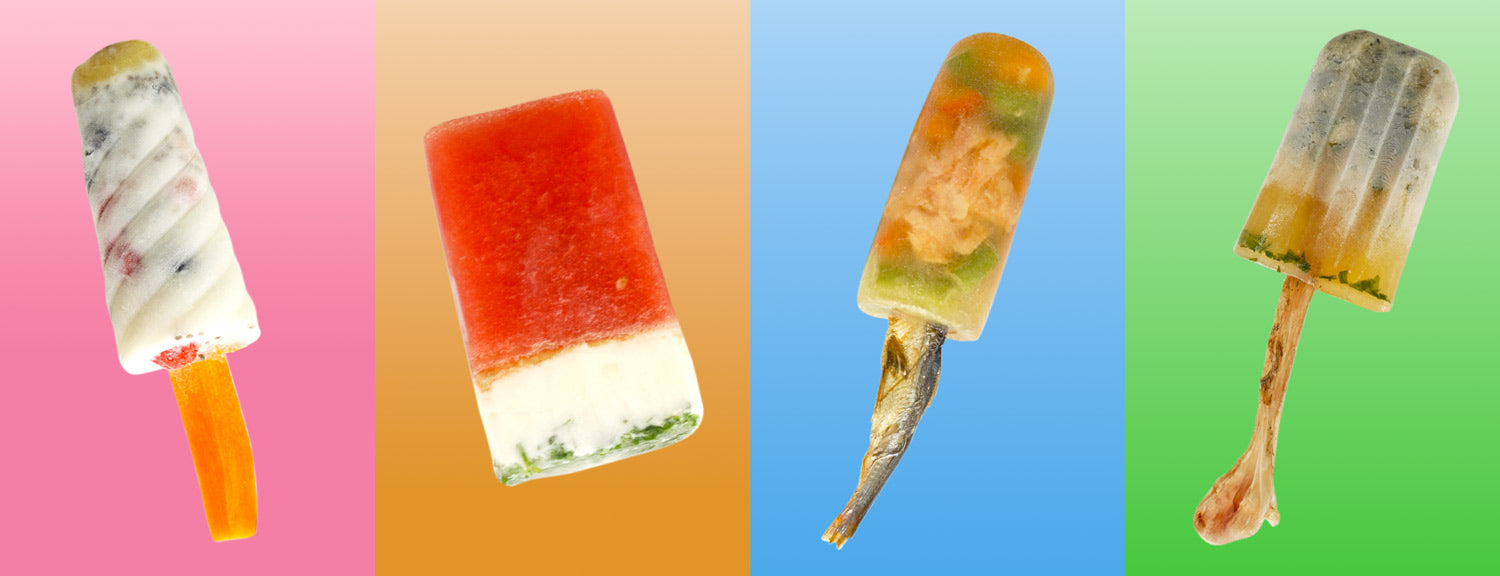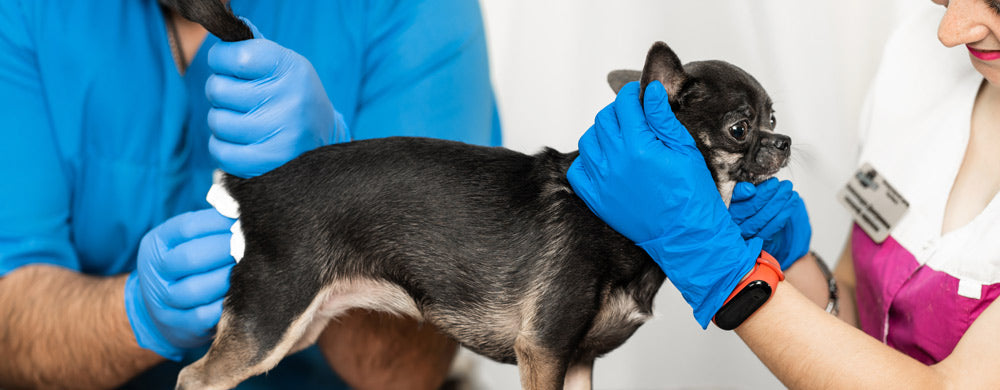Your basket is empty

6 Ways to Keep Your Dog’s Teeth Clean and in Good Shape
December 05, 2021 8 min read
It doesn't have to be a chore to keep your dog's teeth healthy. By using dietary supplements and teethers, you can turn that daunting task into a quick, easy activity, while also ensuring your companion’s pearly whites are in tip-top shape.
***
Why Dental Care Is Important in Dogs
Up to 80% of dogs have tooth and gum problems, according to VA Hospitals. It's essential to look after your dog's teeth from the start to reduce the chances of your pooch developing issues in the future.
A lack of reasonable care could become a significant problem that is tough to resolve if not dealt with swiftly. Food debris and microorganisms produce deposits on your dog’s teeth, which will usually emit a foul odour and cause pain that can prevent your pooch from eating properly. Your dog’s teeth may also become brittle and form tartar. Gum disease and periodontitis are among some of the serious conditions that can affect your dog's mouth.
Teeth that have been neglected for long periods may begin to chip, break off, or even fall out altogether. Toothaches may cause a loss of appetite, weight loss or weight gain, listless behaviour, and socialising issues in dogs. Furthermore, bacteria can enter your dog’s body through saliva, which can lead to heart disease, kidney disease, and liver disease. That’s why keeping on top of your dog’s dental hygiene is crucial.
To prevent dental issues from occurring in your dog, examine your pet's teeth and gums at least once a week, preferably when cleaning. If your dog’s teeth have a yellow covering and their gums are red or bleeding, you should seek immediate veterinary treatment.
***
How to Keep Your Dog’s Teeth Clean
These six simple techniques will keep your dog's teeth clean:
I. Brushing
Brushing your dog's teeth is one of the most crucial stages in maintaining their oral hygiene. Ideally, your dog’s teeth should be cleaned every day, but if you can only do it every 2–3 days, that’s better than not brushing at all.

Special brushes, gauze pads, and dog-safe toothpaste are readily available in pet stores and veterinary facilities. Human toothpaste should not be used as it contains ingredients that can be harmful to dogs, alongside a different texture.
Brushing does not have to take long - even a half-minute is sufficient. Circular movements should be used, with the brush angled at 45 degrees so that the bristles reach the gingival groove.
It's best to introduce this task to your dog during a time of day when they're a little fatigued, such as after a walk. To help your dog get used to the toothbrush and toothpaste, it's a good idea to give them small treats during the training process. It’s a new experience for your four-legged friend, so it should be positively associated to prevent any problems in the future. Don’t force anything to happen and start off slow.
For instance, if your dog is comfortable in the presence of the toothbrush after the first session but you haven’t managed to brush their teeth yet, that’s completely fine. Be gentle and progress at your dog’s pace until they are calm and relaxed throughout the brushing routine.
- To get your dog accustomed to having their teeth brushed, build up their confidence using treats and rewards. Begin by asking your dog to sit still for several seconds, making sure to offer a treat upon successful completion.
- Next, lift up your dog’s gums and give them a treat. Then rub your dog’s gums softly with your finger, followed by another treat.
- Once your dog is happy with the prior steps, start brushing your dog’s teeth with some dog-safe toothpaste on your finger. You can then start introducing the toothbrush by allowing your pooch to lick some toothpaste off of it.
- After your dog is comfortable with the brush, you can start to add it to their dental care routine. Prioritise your dog’s top teeth first.
- When your dog is happy with having their top teeth brushed, you can then incorporate their entire mouth. Continue using treats during training until your pooch is 100% comfortable with having their teeth cleaned.
II. Eating Habits
A healthy diet is an essential aspect of dental care. Dry food is thought to be better than wet food as it’s believed to assist with the removal of debris and plaque on your dog’s teeth. However, whether this is true is open to debate. Additionally, some dogs might swallow the dry crisps whole or chew in half, which will not contribute to plaque abrasion in any manner.
All micronutrients and components that build bones and teeth should be included in a well-balanced diet for your dog. The most important nutrients to build strong bones and teeth are calcium and phosphorus, alongside vitamin D to help your dog absorb both of the aforementioned nutrients through their food.
You can also explore a BARF diet, which allows your dog to clean their teeth naturally while eating bones.
III. Dietary Supplements
In addition to dog-friendly toothpaste, other products can help you care for the hygiene of your dog’s teeth adequately, such as dietary supplements. They can be added to meals or water. Kelp or kaolin, for example, alter the characteristics of saliva, reducing the number of bacteria in the mouth.
The production and deposition of calculus on the teeth is prevented by kelp. It’s available in powder form, making it easy to disguise in food or treats. It reduces tartar formation in dogs and improves the colour of black hair and skin.
Kelp has a positive impact not only on your dog's teeth but also on their overall resilience and coat quality. It’s a great source of iodine, too. Kelp can even aid in the treatment of thyroid disorders (except for hyperthyroidism, which is contraindicated by excessive iodine) and allergies. The product is recommended to prevent numerous diseases, including cancer, due to its high level of unsaturated fatty acids and folic acid.
Our Chomper tartar and plaque remover contain a blend of dried seaweed and kelp to prevent bacteria and tartar build up in your dog’s mouth, allowing you to provide your pup with all the benefits above in one handy supplement!
Kaolin is also available on the market. It is a fine-grained natural white kaolin clay that is mined from the depths of the earth from suitable sedimentary rocks. For dogs and cats, this is the ideal dietary supplement. It cleans, protects, and soothes irritations of the intestines and skin. Additionally, kaolin supports the body's digestion and detoxifying functions. That’s not all! It’s also effective for treating diarrhoea and also helps compensate for electrolyte deficits (silicon, magnesium, lithium, sodium and potassium).
IV. Toys, Teethers, and Treats
It's a good idea to include treats designed to keep your four-legged friend's teeth healthy in their diet. Dental treatments clean your dog’s teeth while also strengthening their gums. This is one of the most effective ways to keep your dog's teeth clean. There are numerous possibilities! However, it is essential to make an informed decision.
Many of the products on the market aren't exactly safe or healthy. They are frequently loaded with unneeded chemicals and sugar, which are bad for your dog’s teeth. It's essential to consider the nutrient and ingredient aspects of teethers while making your selection. Polyphosphates, zinc, green tea, and clove extracts will all be excellent choices.
As we know how challenging it is to find healthy dental dog treats on the market (that also taste appetising!), we decided to formulate our own, aptly named Goodie. Our dental treats contain a blend of sweet potato, wild boar, activated charcoal, peppermint, green tea, parsley, among other beneficial nutrients and minerals. They promote fresh breath and help reduce tartar development in dogs to assist you with your companion’s dental care.
Safe Treats, Toys, and Teethers for Dogs
Cow horns, deer antlers, dried ears, and tracheas are just a few of the natural chews that are amazing examples of healthy chews we can have on hand. Dried meat can also be prepared at home, as well as carrots.
Biting improves dental and gum health, lowers tartar, and assists digestion. It also has a behavioural effect and aids in your dog's relaxation. However, some chews and treats are high in calories or fat, so they should be included in your dog’s regular food intake.
Vegan teethers are also available on the market. They are good alternatives to animal-based products. The root tuber of a plant called Wood Briar, which grows in the Portuguese mountains, is used to make an excellent natural dog chew. It works wonders for tartar buildup in dogs.
Torga is a fantastic alternative for dogs who prefer to chew on sticks as it won’t splinter. Better yet, it has a long lifespan and does not cause allergies. Each one has a distinct shape with no sharp edges on the surface thanks to meticulous smoothing and cleaning.
It’s critical to select a teether that is appropriate for your dog's size and age. You should also keep in mind that no matter which teether you choose, you should always supervise your pooch while they’re playing with it. That way, if your dog chokes or bites off an excessively big section, you’ll be able to intervene quickly.
Last but not least, toys can aid your four-legged friend's oral hygiene. Many types are available on the market that clean your dog's teeth and massage their gums while they play.
Cooked Bones Should Not Be Given to Your Dog
Cooked bones can splinter, shatter, and cause your dog to get wounds, obstructions, and other difficulties. The safest option for your pooch is raw bones. You can get uncooked bones at your local butcher, meat processing facility, or another similar establishment.
Another precaution worth noting is to avoid spreading germs by handling meat bones. Be conscious of the situation and wash your hands after touching the bones. Additionally, try to confine your dog's bone gnawing to a small area so that you can sterilise it afterwards.
V. Regular Dental Checkups
It's also crucial to have your dog’s teeth checked by a veterinarian on a regular basis, which should be done at least once a year. If your dog's teeth are covered in tartar, your vet may recommend a procedure that involves teeth cleaning while your pooch is under anaesthesia.
However, keep in mind that any anaesthesia is a significant burden for your dog, so it’s always best to avoid this situation, especially if your pet is older.
VI. Use a Plaque Remover
If you are worried about your dog developing plaque or tartar, or it has started growing, it may be beneficial to use a plaque remover powder.
As mentioned earlier, our supplement, Chomper, works wonders for eradicating plaque and tartar. It’s a 100% natural blend of dried kelp and seaweed that has been selected for its antibacterial and tartar-fighting properties. Our supplement contains 12 vitamins, 13 minerals, and trace elements that work together to promote good dental health, defend against gum disease, and decrease plaque and bad breath in your dog.
However, Chomper is not a replacement for teeth brushing - it should be used alongside brushing. Both will assist in removing plaque and tartar while also keeping your pet's mouth clean. There are no fillers, artificial colours, flavours, or ingredients in Chomper. It works as a canine teeth cleaner as well as a breath refresher to keep bad smells to a minimum (at least from your pooch’s mouth!). It comes with a scoop that is precisely metered and is suitable for dogs and pups over the age of eight weeks.
Chomper is made in the United Kingdom and contains three different types of kelp and seaweed from Scandinavia and Cornwall. Compared to any other category of plants, kelp and seaweed provide the most various minerals and vitamins. They provide critical vitamins, minerals, amino acids, and antioxidants, as well as improving the health of your dog's teeth, removing plaque, and aiding in the treatment of bad breath. Bacillus licheniformis, a bacteria found in kelp, produces an enzyme that breaks off the plaque on teeth.
Benefits of Using a Tartar Remover
Tartar removers like Chomper work by dissolving existing tartar, making it easier to remove with chewing or brushing. Bacteria cannot adhere to dental enamel, tartar build-up is decreased, and existing plaque is loosened.
Chomper also aids in the fight against bacteria, which is a leading cause of bad breath, ensuring that your dog's breath is always fresh. A good source of vitamins and minerals will support your dog's dental health and keep gum disease at bay.
***
Your Pet's Happy, Healthy Smile
Everyone will undoubtedly discover something suited for their four-legged companion. It is worthwhile to combine many choices. Goodie and Chomper are two advantageous supplements that you can offer to your dog to keep their teeth healthy and clean.
Remember to clean your dog’s teeth every few days and to see your dentist for an annual dental exam to keep their dental hygiene in good check.
Also in Pet Advice

Should You Add Water to Your Dog’s Kibble? Here’s What the Science Says
August 14, 2025 7 min read
Should you add water to your dog’s kibble? Discover the science-backed pros, cons, and better alternatives like bone broth and fresh food to improve hydration, digestion, and overall canine health...

DIY Frozen Dog Treats Your Pup Will Love
June 27, 2025 4 min read
Summer heat can be dangerous for dogs, making hydration more important than ever. Learn how to spot signs of dehydration, boost your pup’s water intake, and create fun, frozen recipes to keep them happy and healthy all season long.

Why Is My Dog Scooting? Common Causes and How Diet Can Help
May 09, 2025 4 min read
If your dog is scooting or smells fishy, it could be due to blocked or irritated anal glands. Learn what causes blocked anal glands, which dogs are most at risk, and how simple dietary changes—like adding fibre and anti-inflammatory nutrients—can help prevent recurring problems.


